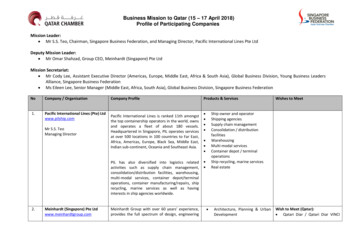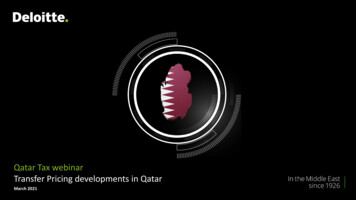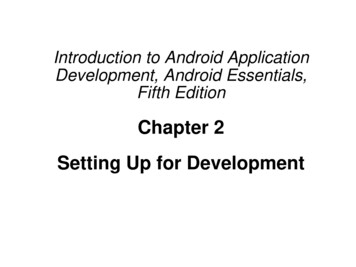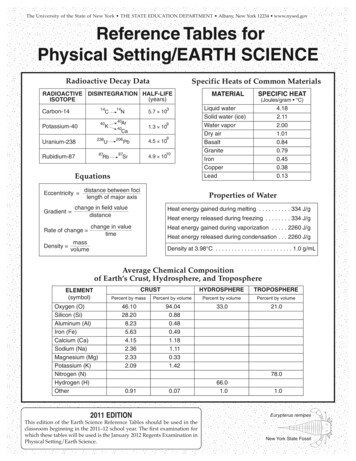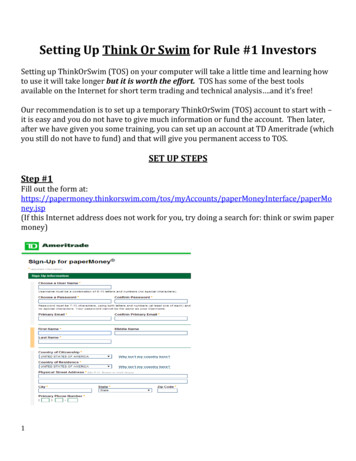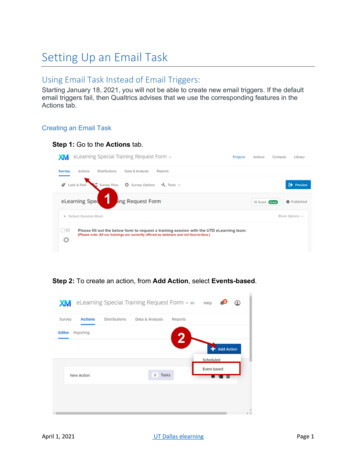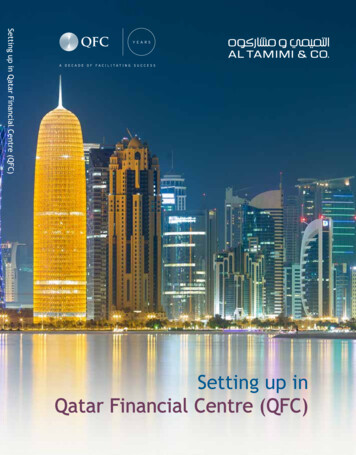
Transcription
Setting up inQatar Financial Centre (QFC)
Setting up inQatar Financial Centre (QFC)
Published by Al Tamimi & CompanyQatar OfficeAl Jazeera Tower, 7th Floor61 Conference Street, Zone 61PO Box 23443West BayDoha, QatarT: 974 4457 2777F: 974 4436 0921E: infoqatar@tamimi.comKey Contacts:Al Tamimi & CompanyQatar Financial CentreHusam HouraniManaging Partnerh.hourani@tamimi.comEl Sadiq AlFatih HamourDirector of Business Developmente.hamour@qfc.qaHani Al NaddafHead of Qatar Officeh.alnaddaf@tamimi.comBasma Yousef NourDirector of Client Affairsb.nour@qfc.qaFrank LucentePartner, Qatar Officef.lucente@tamimi.comRafiq JafferPartner, Head of Banking & Finance, Qatar Officer.jaffer@tamimi.comAngela MaglieriDirector of Marketing & Business Developmenta.maglieri@tamimi.comDesign: Waad Barghouthi Al Tamimi & Company. All rights reserved 2016.The content of this book are not intended to be a substitute for specific legal advice on any individual matters. No part of thispublication may be reproduced, distributed, or transmitted in any form or by any means, including photocopying, recording, orother electronic or mechanical methods, without the prior written permission of the publisher, except for individual use and othernon-commercial uses permitted by copyright law. The permission to recopy by an individual does not allow for incorporationof the material in part or in whole of any work or publication, whether in hard copy, electronic or any other form, unless specificmention is made to the source, “Setting Up in Qatar Financial Centre (QFC), published by Al Tamimi & Company,” and writtenpermission is granted by the firm. For more information, please contact us.www.tamimi.com
ContentsForewords.1Chapter One - An Introduction to the QFC.3Chapter Two - Structure of the QFC.9Chapter Three – The Legal Framework.11Chapter Four- Non-Regulated Activities.14Chapter Five – Regulated Activities.29Chapter Six - Companies Registration Office.49Chapter Seven – Employment and ImmigrationLaw in the QFC.52Chapter Eight - Tax in the QFC.57Chapter Nine - QFC Courts.61v
ForewordsHusam HouraniManaging PartnerAl Tamimi & CompanyOur guide ‘Setting up in QFC’ aims to provide companies and individualswith the vital information they need when considering setting up a businessin the QFC. This guide seeks to answer some of the most importantquestions that investors face regarding their business structures based onspecific activities they wish to undertake.viAs one of the GCC regional business hubs, Qatar is experiencing a growthphased and consistently strives to reinforce its positions as a commercial,cultural and economic leader in the GCC and beyond.We were honoured to work with the QFC to develop this guide and trustthat you will find this information valuable and provide you with a greaterunderstanding of the business and legal aspects of setting up a businessin the QFC.We look forward to the opportunity to work with you to ensure your successwhen doing business in Qatar.
vii
Chapter One8Chapter OneAn Introduction to the QFC
Introduction to the QFC1
Chapter OneAn Introduction to the QFC2QatarAs one of the world’s leading exporter of liquefied natural gas, Qatar is oneof the fastest growing economies in the world. Its economy is expected togrow by 4 – 4.5 percent in 2015 despite oil price plunge. It has the world’shighest GDP per capita at well over US 100,000, a strong populationgrowth, solid credit rating and it has achieved budget surpluses for manyyears.Qatar is using its wealth and large revenues from oil and gas to enhancelong-term developments in other economic sectors in accordance withQatar’s National Vision of 2030. Qatar’s National Vision of 2030 setsout the state’s long-term economic, social, human and environmentaldevelopment goals.In an effort to attract foreign investment into Qatar, the Qatar Governmenthas issued new laws to create a favourable business environment forforeign investors. Amongst these is Law No. 7 of 2005 creating the QatarFinancial Centre (QFC Law).
Introduction to the QFCWhat Is The QFC?The QFC is a business and financial centre located in Doha. It wasestablished by virtue of Law No. 7 of 2005 (as amended), with the aim toenhance growth and diversification of Qatar’s economy, and to provide anattractive platform for firms to be established and do business in Qatarand the region. The QFC provides a transparent environment and offersflexibility to conduct business inside or outside Qatar.The QFC was first set up to offer domestic and international firms theopportunity to establish and provide a broad range of financial servicesrelated to banking, asset management and insurance businesses. Inaddition to the financial-type regulated activities, the QFC expanded thescope of its permitted activities to include non-regulated activities that arenot financial-type services.The QFC offers its own legal, regulatory, tax and business infrastructure,which allows 100% foreign ownership, unlimited repatriation of profitsand a competitive rate of 10% corporate tax on locally-sourced profits.Since the QFC is not a separate geographical zone, all entities in the QFCoperate on a fully onshore basis with the ability to access the local marketand operate from more than 50 locations all over Doha with no restrictionson the currency in which they can trade.Recent Developments In The QFCThe QFC has recently undertaken several legal and structuralenhancements. A number of enhancements have been introduced to clarifyvarious aspects of the QFC legislation in order to give QFC entities morecertainty and flexibility in various aspects of the entities’ operations. In anattempt to provide a more efficient registration or incorporation process,the QFC agencies are now responding to applications to set up in the QFCin a shorter time frame.The QFC has also expanded the scope of the non-regulated activities thatcan be undertaken. The Qatar Financial Centre has recently broadenedthe definition of, amongst others, the provision of “professional services”to include “any business which provides qualified business to businessservices” such as management consulting, IT services, media, events3
Chapter Onemanagement and engineering and environmental consulting. A range ofstructures for investing and holding assets, or managing business interestsand operations can also be accommodated.More information on the professional services activities which are permittedas non-regulated activities is set out in Chapter Four.How Is The QFC Made Up?The QFC is made up of four independent bodies: The QFC Authority (QFCA); The QFC Regulatory Authority (QFCRA); The Civil and Commercial Court; and The Qatar Regulatory Tribunal.For a full explanation of each of these bodies, please refer to ChaptersTwo and Nine.4What Are The Permitted Financial Activities In The QFC?The financial services currently permitted and regulated by the QFCRA are: Banking»»Corporate or wholesale banks;»»Investment banks; and»»Private banks.Asset Management»»Retail schemes;»»Qualified investor schemes; and»»Private placement schemes. Insurance/Reinsurance Captives; (Re) Insurance brokerage; and Islamic finance.
Introduction to the QFC Investment advice and investment services»»Fiduciary businessesWhat Are The Areas of Non-Regulated Activities In The QFC?The following activities are deemed to fall within the ambit of non-regulatedactivities: Professional, corporate and business services; Company headquarters, management offices and treasury functions; Special purpose companies; Holding companies; Trusts and trust services; and Single family offices.The Board of the QFCA has approved a list of 17 additional non-regulatedactivities which could fall within the realm of “professional services”.QFC-licensed firms must operate within the remit of sophisticatedbusiness-to-business services. Activities which cannot be performedinclude construction, the import, manufacture or sale of physical goods,and labour-intensive services. Companies providing such activities cannevertheless benefit from the QFC environment by establishing holding,investment or management structures within the QFC. The complete list ofnon-regulated activities is set out in Chapter Four.What Laws Apply In The QFC?The QFC provides an alternative legal system to that of the State of Qatar.However, certain laws are still applicable to QFC entities, such as theLaw No 11 of 2004 establishing the Penal Code and Law No 4 of 2010Combating Money Laundering, which is applicable to regulated entitiesundertaking financial services in the QFC.The QFC has developed a comprehensive set of laws, rules and regulationsfor businesses. For example, QFC regulations cover the following areas: Contract; Financial services; Insolvency;5
Chapter One Immigration; Employment; Data protection; and Tax.In December 2013, the Qatar Central Bank, QFCRA and the Qatar FinancialMarkets Authority jointly launched a strategic plan for the future of financialsector regulation in Qatar. The plan established a framework to unify policyunder a Financial Stability and Risk Control Committee.Tax In The QFCWhilst tax havens are under increasing international pressure for manyreasons which may have put pressure on corporations, funds andinvestment structures to move away from off-shore domiciles, QFC remainsan onshore jurisdiction with a highly cost-effective operating environment.The QFC offers the following benefits:6 No withholding tax, personal income tax, wealth tax, zakat or valueadded taxes (VAT); Corporate tax rate of 10% on locally-sourced profits; Tax exemptions for company headquarters and holding companies onmost activities, dividends and capital gains; Tax exemptions for qualifying special purpose vehicles; Tax exemptions for investment holding companies; Binding advance rulings from the QFCA on tax issues, providing QFClicensed firms with a high degree of certainty; and Double taxation agreements with over 60 different countries.The QFC publishes its entire in-house tax guidance the “QFC Tax Manual”online. The manual is intended to help corporate taxpayers and theiragents interpret the rules and regulations and to provide them with greatercertainty, clarity and assistance in preparing tax computations and returns.The QFC tax regime is more fully set out in Chapter Eight.
Introduction to the QFCThe QFC And The State Of QatarOne of the key differences between setting up in the QFC as opposed toQatar is that regulated entities undertaking financial services in the QFCwill not be subject to the Qatar Central Bank’s regulations, although asmentioned above, they would still have to comply with the Law CombatingMoney Laundering.The other key difference is that QFC entities are not subject to the ownershiprestrictions provided for under the Law No 13 of 2000 establishing theForeign Capital Investment Law. The general rule for setting up an entity inQatar requires a Qatari shareholder to hold at least 51% of the company’sshares. The Foreign Investment Law of Qatar only permits 100% foreignownership in particular areas stated under the Foreign Investment Lawsubject to the Minister of Economy and Commerce’s approval (which isdiscretionary).However, the QFC allows for the establishment of 100% foreign ownedentities, whether in the form of a limited liability company, branch of a nonQFC company, limited liability partnership or a branch of a non-QFC limitedliability partnership. It also allows for the establishment of special purposecompanies that are companies set up to carry out specific transactions.More details on the setting up of a special purpose company in the QFCare set out in Chapter Four.Whilst the actual process of setting up a legal entity in the State of Qatarrequires the involvement of the Ministry of Economy and Commerce atvarious stages of the incorporation process and may require communicationwith other government authorities for certain approvals, the set up processin the QFC is a clear and streamlined process where there is a dedicatedrelationship manager to support individuals and companies wishing to belicensed in the QFC. Under the QFC Law, any person properly licensed inthe QFC does not require any further licenses from the State of Qatar.The QFC’s tax regime features more transparency, certainty, availability ofmaterials on line, and accessibility for ruling than one would find under theState tax regime.The QFC And The Dubai International Financial Centre (DIFC)Similar to the QFC, the DIFC is a business centre established in the Emirateof Dubai to attract foreign direct investment. Both the QFC and the DIFCjudges seem to apply English-style common law, and therefore, the QFC7
Chapter Oneand the DIFC share many similarities in respect of the treatment of foreigninvestors setting up within the QFC and the DIFC and the exemption froma number of specific laws such as foreign investment laws.The DIFC has three independent bodies: the DIFC Authority, the DubaiFinancial Services Authority (DFSA) and the DIFC Judicial Authority.However, while the DIFC is a defined and separate geographical “freezone” area, the QFC is not a geographical area; it is an onshore jurisdictionthat is separate from the jurisdiction of the State of Qatar. For example,unlike a DIFC-licensed entity which has to have its office in the DIFCgeographic area, a QFC licensed entity can have its office and conduct itsbusiness anywhere in Qatar provided that the approval of the QFCA hasbeen obtained in respect of the particular premises.The DIFC is a dollar-denominated environment that does not permitregulated entities licensed by the DFSA to deal with or trade in the UAEdirham. However, the QFC has no restrictions in terms of currency in whichQFC-regulated entities may deal; they may deal in or take deposits inQatari Riyals or any other currency.8The QFC And the Bahrain Monetary Authority (BMA)Unlike the entities undertaking financial services in the QFC and the DIFCthat are exempted from the respective central banks’ regulations andcertain other local laws, financial activities in Bahrain are regulated bythe Bahrain Monetary Authority (BMA), which is the Kingdom of Bahrain’scentral bank and the single regulator for the financial services industry.Although Bahrain does not have international business centres similarto the DIFC and the QFC where investors can obtain certain exemptionssuch as 100% foreign ownership of businesses and tax exemptions. It alsodoes not impose any personal income tax, withholding tax or capital gainstax. Furthermore, the BMA provides separate rules for banks and Islamicfinancial institutions and firms providing investment businesses.Bahrain has also established the Bahrain Financial Harbour, where financialinstitutions can be located in one focal area in an effort to enhanceBahrain’s position as a financial capital in the Middle East.
Introduction to the QFCLimits To Where QFC Firms Can OperateAll firms in the QFC operate on a fully onshore basis. They can access thelocal market, operate from any of well over 50 locations all over Doha andface no restrictions regarding the currency in which they can trade. A firm’scustomers may be based locally, regionally or internationally. However, afirm may not engage in any financial activities prohibited by the QFCA orQFCRA, irrespective of where its customers are based.9
Chapter One10Chapter TwoStructure of the QFC
Introduction to the QFC11
Chapter TwoStructure of the QFCThere are several key organisations within the QFC which enable it tofunction as a self-contained financial services centre based on internationalstandards:12
Structure of the QFCQatar Financial Centre Authority (QFCA)The QFCA is responsible for managing commercial and strategic aspects ofQFC registration. It was established by virtue of the QFC Law to undertakecommercial strategy and business development for the QFC. The QFCAcarries out the following main objectives and responsibilities: Establishing, developing and promoting the QFC; Managing and maintaining the QFC legal and tax environment;determining the terms and conditions for the issuance of licences forthe entities carrying out permitted activities in or from the QFC; andproviding assistance and services to QFC entities through the set-upprocess and beyond.Qatar Financial Centre Regulatory Authority (QFCRA)The QFCRA is an independent body established under the QFC Law, whichauthorises and supervises financial services firms that conduct regulatedactivities in or from the QFC.The Civil and Commercial CourtThe Civil and Commercial Court (first instance and appeal division) isan independent court which is modelled on the courts of common lawjurisdictions, from where most of the judges hail.The Civil and Commercial Court has jurisdiction in relation to civil andcommercial disputes arising from business relationships or incidentswhere a QFC entity or institution is a party to the dispute.The Regulatory TribunalThe Regulatory Tribunal is an independent body established to hear anddecide on appeals from decisions of the QFCRA and the QFCA and theirdepartments. The Regulatory Tribunal was established with the intent thatthe rights and interests of QFC entities would be protected in accordancewith the law.Procedures at the Civil and Commercial Court and the Regulatory Tribunalare conducted in English; however, the parties have the right to use Arabic.The courts have their own procedural rules which are distinct from therules applicable to and in the courts of the State of Qatar, albeit not asextensive as rules one would find in most common law jurisdictions. Thisis dealt with more extensively in Chapter Nine (Courts).13
Chapter One14Chapter ThreeThe Legal Framework
Introduction to the QFC15
Chapter ThreeThe Legal FrameworkQFC Law16The QFC Law establishes the judicial bodies necessary for its operation.These include the Civil and Commercial Court (first instance and appellatedivisions) and the QFC Regulatory Tribunal.The Chairman of the QFCA, in his capacity as Minister of Finance, has thepower to enact regulations that are administered by the QFCA, includingany appropriate amendments or modifications. Some regulations – suchas those concerning the QFCRA, the Civil and Commercial Court and theQFC Regulatory Tribunal – need the consent of the Council of Ministersbefore being enacted.Key ProvisionsThe QFC Law contains provisions concerning a number of areas. Theseinclude provisions regarding:1.The QFC Board, its make-up, powers and authorities;2.The QFCA, its objectives and powers;3.The Companies Registration Office;4.The QFCRA, the Regulatory Tribunal and the Civil and CommercialCourt;5.Powers to make regulations;6.Permitted activities;
The Legal Framework7.Licensed operations;8.Revenues of QFCA; and9.Taxation.Each of the QFCA, the QFCRA, the Regulatory Tribunal and the Civil andCommercial Court, is exempted from the control of the State Audit Bureau.However, such authorities are required to maintain accounting recordswhich are sufficient to show and explain their transactions.The QFC tribunals mentioned above are also not subject to any civil liabilityin relation to all acts or omission done or omitted to be done or negligencein good faith during course of performing or trying to perform their duties,powers, responsibilities and tasks as prescribed in the QFC Law or otherregulations.Interaction with other lawsThe criminal laws and sanctions of the State of Qatar apply in the QFC.However, pursuant to article 18 of the QFC Law, the conduct of anybusiness in the QFC in accordance with the approval, authorisation orlicence issued
Published by Al Tamimi & Company Qatar Office Al Jazeera Tower, 7th Floor 61 Conference Street, Zo

